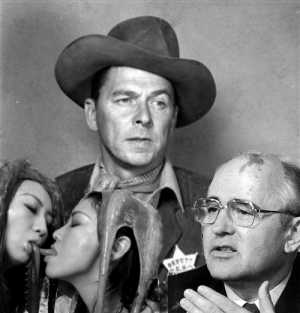NeoContract with America
With the election of George "GeeDubya" Bush to the presidency and with controlling majorities in both the American House of Representatives and the Senate, in 2000 American conservatives pulled together as never before. For the new millennium they unveiled a new neoconservative Contract with America—a NeoContract --- meant to deliver on the unfulfilled promises of the abortive conservative revolution started by the Reagan Revolution and continued by the noted loose cannon Newt "Boom-Boom" Gingrich.
The Beginning[edit | edit source]
Modern American conservatism came of age in a Proustian sense with the presidency of Ronald "Bonzo" Reagan. As the great man later said, "I...I don't remember a thing. Where's my Jello®, Mommy?"
The Reagan Revolution of the 1980s attempted to --
- 1. Shrink government. Federal bureaucrats were to be no more than 5 feet tall, many minor departments were merged into the Federal Waste Of Time Department and subsequently deported to Angola, and the Department of the Interior worked out of a lavatory in Yonkers. The FDA reputedly had to deal cocaine in order to pay for office space.

- 2. Cut taxes. On the theory that government would in the future be smaller, conservatives reasoned that the government didn't need money right now. They succeeded in removing much of the tax burden from their corporate sponsors but -- oddly enough -- taxes for average Americans were higher at the end of Reagan's presidency than when he took office. As the great man later said, "You, you just can't make an omelette...an omelette without....Where's my Wheaties®, Mommy?"
- 3. Build up the military. Relying on the tax revenue already given up, Pentagon budgets nevertheless swelled up like weaner pigs at a Chinese buffet. Namby-pamby liberals bemoaned the flood of federal debt that resulted, but it was justified by such programs as the Missile Defense System which to this day -- after twenty years' technological progress -- is fully as effective as a frog in a blast furnace.
- 4. Eliminate the global threat posed by Grenada. This Carribean island nation did something bad which nobody remembers, and Reagan sent in the Marines to slap the islanders around and kill a few of 'em. The famous victory removed the stain of the Vietnam defeat from American minds, and allowed Americans to stand up proud and tall, confident that they could kick the shit out of any tiny island country around.
- 5. Pressure the USSR toward collapse. Since the 1950s it had been clear that the USSR was headed for a social and economic implosion. The Soviet planned economy ticked along like clockwork -- assuming that the clock in question had been run over by a tank -- and Soviet citizens were so depressed they could only face the world through the bottom of a vodka bottle. Reagan made a couple of speeches castigating the USSR. Later the Soviet system imploded.
- 6. Eat more beef. As the cattle industry languished, oppressed by Chinese intervention in ox futures, the Reagan administration took action. Spending more money it didn't have, the government offered no-interest loans to establish cattle feedlots, and opened all federal lands to cattle grazing. Breeders of bovines reacted joyfully, herds increased exponentially, and by the end of the Reagan years the nation was up to its collective neck in conservative bullshit.
This, then, was the Reagan Revolution, the seed from which the NeoContract with America would sprout.
The Gingrich Years: Flash in the Pan[edit | edit source]
Upon achieving power in the 104th Congress, 1994, Republican conservatives were in the uncomfortable position of having to follow through on promises. Specifically, they had written a document they called a "Contract on America" in which they said that if they won a majority they would hold the nation to certain standards of responsibility.
- 1. Fiscal responsibility. This mandated no debt spending by Congress. The tide of red ink which under Reagan had grown to record proportions was to be stemmed. Congress would of course have to give up pork-barrel spending and actually hold itself accountable. One can easily see the existential dilemma created by this promise.
- 2. Personal responsibility. The Congress aimed to discourage teen pregnancy by denying welfare to mothers under 18 years of age. As Dick "Angry" Armey said, "We will simply starve the little whores and their bastard children to death. That will take care of the problem right there." Scholars cite this speech by Armey as the beginning of the "compassionate conservativism" movement.
- 3. International responsibility. As the USA exists on a separate planet from all other nations the Contract proposed that US forces would not cooperate with the United Nations, and the US would not support the UN financially. The US delegate to the UN would sit in the front row and make rude noises during UN sessions. The Contract also required New Yorkers to throw rocks at UN delegates if they saw them abroad in the streets during daylight.
- 4. Legal responsibility. Individuals would not be allowed to sue corporations under most circumstances. This aimed to limit what the Republicans viewed as "frivolous" lawsuits which inconvenienced their most generous campaign contributors. Specifically, plaintiffs had to be physically maimed or murdered by "...the hand of the corporate executive officer himself" before any legal action could be taken against any corporation. In the unlikely case where such actions could be proved, damages were limited to $100 in the case of maiming and $200 in the case of death.
- 5. Legislators' responsibility. The Contract proposed to limit the number of terms which could be served by congressmen and senators. In an act of mind-boggling chutzpah, Republicans asked the public to believe that they would kick themselves out of office after a couple of terms. Needless to say, after they were elected this promise went down the toilet.
The House Speaker, Newt "Dum-Dum" Gingrich, became the public face of the Contract after the 1994 elections. At this point he had run out on his first wife because she got cancer and had been screwing a young White House clerk behind his second wife's back for a couple of years.
This of course made Newt a perfect example of Republican personal moral responsibility.
Ten years on, with Republicans still in power, nothing remains of the Gingrich Contract on America.
The NeoContract[edit | edit source]
As an undergraduate at Harvard George "GeeDubya" Bush had watched President Reagan in "Bedtime for Bonzo" and imagined what it would be like to lead the free world—or, better yet, to be a chimp sitting on "Dutch" Reagan's lap.
Thus, when elected to the presidency by a landslide vote of the Supreme Court, Bush vowed to follow in his hero's footsteps. Of course his good friends Karl "Kingmaker" Rove and Dick "Head" Cheney had to give him permission, but they too hungered for a new conservative revolution. "OK, boy," they said, "let's go for it."
The plan of action hammered out by these men—plus Don "Torquemada" Rumsfeld and Paul "Conquistador" Wolfowitz—was to guide America for the next eight years. The similarities to the Reagan Revolution are striking.
1. Shrink the federal government.[edit | edit source]
This was done by the simple expedient of creating massive new bureaucracies and adding to the already impressive population employed by existing agencies. Under Bush's plan, Americans enjoyed paying the salaries of more federal employees than ever before. Homeland Security and National Security Service, Faith-based Community Services and a Prison Ministry Program, more FBI and CIA agents—federal government grew 35% in the non-military, discretionary sector during Bush's presidency. Government grew faster than it had under Ford, Carter, Reagan, Bush I, or Clinton. It swelled up faster than a porn-star's pecker when the cameras start rolling.
2. Cut selected taxes.[edit | edit source]
Straight out of Reagan's playbook, this ever-popular move continued the conservative trend that has cut the share of taxes paid by corporations by almost 75% and the share paid by the wealthiest by two thirds over the last 50 years. The massive tax breaks for corporations and the wealthy was made acceptable by offering the average, working-schmuck taxpayer free Tootsie-Rolls® and a coupon for half off Fruit-of-the-Loom underwear at Sears. Of course the share of taxes paid by the lower tax brackets has increased from 51% to 83% over the timespan mentioned, but the lower middle class and poor are happy with their candy and new underwear.
3. Deficits don't matter.[edit | edit source]
Here the NeoContract has not just followed Reagan, it has blown his record red ink all over the page. Promising to reduce the federal deficit at every election, Bush has cannily increased it by record-breaking proportions instead.
Forced to borrow staggeringly huge amounts of moolah, the USA looked to China, France, Germany, Russia, Monaco, Lichtenstein, Andorra, and Bora-Bora to finance its burgeoning government expenditures. As a result, by 2004 China owned 51% of the US government and Bora-Bora had purchased Poughkeepsie outright. The Food and Drug Administration was leased to Baluchistan with an option to buy after 5 years. Ironically, the Department of Homeland Security was bought at auction by a Greek who turned out to be a proxy buyer for Osama bin Laden. Go figure.
4. Build a leaner military.[edit | edit source]
This was Don "Fifty Lashes" Rumsfeld's idea. Without the looming threat of the Soviet Union, Rumsfeld proposed a slimmed down, techno-happy fighting force that would not rely on massive numbers of infantry to accomplish its tasks. Oddly enough, it turns out that the next item on the NeoContract—the invasion of Iraq—made a massive infantry absolutely necessary. Since mid-2003 Don "Whoopsie" Rumsfeld has been taken off the military-trimming project and reassigned to figuring out just how to torture prisoners without leaving those nasty marks that so upset the Red Cross.

5. Secure a stable oil supply by annexing Iraq.[edit | edit source]
Oil is something of a bete noir for GeeDubya Bush. Having bankrupted two oil companies through incompetence, he has a pathological fear of running out of oil. He was overheard telling his wife, "Laura, I dreamed we was back in Crawford and nobody had no oil. Daddy was crying, Laura! My own Daddy was crying and beggin' me to stop drinkin' and find him and Dick a new oilfield. And I couldn't find one, Laura, I couldn't find one..."
Haunted by this nightmare, GeeDubya became determined to invade Iraq and establish Dick Cheney's company Halliburton as the premier developer of Iraqi oilfields. Of course even massive numbers of US troops are unable to contain the restive and well-armed Iraqi malcontents, so Halliburton is reduced to profiteering on military contracts instead of stealing Iraqi oil. Thus, in a humorous twist, US taxpayers have the honor of paying for Dick Cheney's immense "deferred compensation" package from Halliburton by giving that company a huge profit margin on its Iraq operations. Go figure.
6. Eradicate government accountability.[edit | edit source]
Bush conservatives believe that the State is its own justification. Thus the Bush administration has refused to tell the public who its consultants are, what it discusses, where Dick Cheney's secret fort is, why it is investigating you, how it gets information, what it does with people it arrests, and whether the president really does wear a radio under his jacket during debates. If all goes according to plan this will culminate in 2006 with a law forbidding citizens to know what the laws are. It will be a crime to know what you may be arrested for.
The legal scholar and rapper DMX (real name Earl Simmons) noted that this law also makes it illegal to know about the law forbidding you to know about the laws. He has been arrested.
Under this legal innovation the government will be able to arrest any citizen, anywhere, for no reason whatsoever; charge them with a crime they were legally prohibited from knowing about; and send them to a secret prison in Blechoslavia to have their finger joints smashed with ball-peen hammers. The only justification needed is that the Bush administration ordered it.
This practice of unjustified arrests has of course already begun, with a select few pioneering Americans chosen by the Bush administration already hustled off the street and taken to foreign jails for interrogation...or in some cases held incommunicado with no criminal charge or explanation for several years. Some treasonous idiots have claimed that the US Constitution forbids this practice, but they too have disappeared into the Bush gulag system.
In a related incident, Jenna Bush has accused Brad Pitt of "...cooperating with, uh, terroristical sassy studmuffins" and she has asked the CIA to imprison him in her bedroom indefinitely.
Foreign Reactions[edit | edit source]
UK: Tony "Kiss Me Quick" Blair had been brown-nosing Bush so hard he has come down with fecal sinusitus and will leave Downing Street as soon as he packs his lace undies. The identity and reaction of his successor is currently unknown but given the somewhat cynical bent of the English it may be that popular opinion will finally force Britain's leadership to give the USA the horse-laugh it so richly deserves.
Russia: Vladimir "Snake-eyes" Putin has offered to sell America some KGB prison equipment that has languished mostly unused since the breakup of the USSR. He also gifted GeeDubya with a copy of "Leaving Afghanistan: Why Towelheads Are Real Bastards To Subdue" by Reagan's old friend, Mikhail "Glasnost" Gorbachev. The inscription reads "To my soul-friend George with love."
China: As usual, the Beijing leadership is just waiting around to pick up the pieces.
Japan: "Honorable Plesident Bush, you were saying that as result of Japan support of Iraq conflict great Japan nation get all oil necessities taken care of in all future contingency! Now is obvious that you are not deriveliling...delriveling...delivering on these promises. Damn you lotten bastard!"
Implications[edit | edit source]
The NeoContract's version of conservatism, which is to say the conservatism of the Cheney-Wolfowitz-Rumsfeld-Rove group, is explained in papers published by the Project for the New American Century (PNAC). Excerpts follow.
Neoconservatism, the more it considers and observes the future and the development of American humanity quite apart from political considerations of the moment, believes neither in the possibility nor the utility of perpetual peace. It repudiates the doctrine of pacifism, viewing it as a renunciation of struggle and an act of cowardice in the face of sacrifice.
The neoconservative accepts life and loves it, conceiving of life as moral duty, struggle against immorality, and conquest of those who are immoral. This struggle is for all Americans, those who are at hand and those who are far distant, or even outside Washington DC itself.
Neoconservatism combats the whole complex system of Democratic ideology and repudiates it, whether in its theoretical premises or in its practical application. Neoconservatism, properly understood, denies that the majority, by the simple fact that it is a majority, can be relied on to guide society; it denies that numbers alone can govern. Instead, it affirms the immutable, beneficial, and fruitful rule of proven conservative Republican leaders as the best of all possible governments.
Neoconservatism denies, in democracy, the absurd conventional untruth of social leveling, dressed out in the garb of collective irresponsibility. It denies the myth of "happiness" as exemplified by social safety nets and affirmative action...
This and more on the neoconservative social philosophy can be found in the PNAC manifesto of beliefs.
See also[edit | edit source]
- George Bush: chronicle of greatness—The master article in this series.
- American Commitment to the Rights of Man—Analysis of the Bush administration's regard for the universal rights of man as described in the American Declaration of Independence.
- Cost schedule for buying the US government—How much does it cost to buy 15 minutes with George Bush? What about Tom DeLay or Roy Blunt?
- NSA fisting—An in-depth look at the procedures authorized by the Bush Administration for domestic surveillance of Americans.
- Operation Enduring Truth—A report on the success of the campaign to win the hearts and minds of the
VietnameseIraqis through use of paid propaganda. - Reconstruction of Iraq—A look at Bush's masterful "Marshall Plan for the Towelheads" and its beneficiaries.
- Search and Seizure—An analysis of the administration's authorization of extra-judicial surveillance measures to be used against American citizens.
- US Fiscal Policy: Starving the Beast by Feeding It—A look at the Bush fiscal policy and its implementation.
